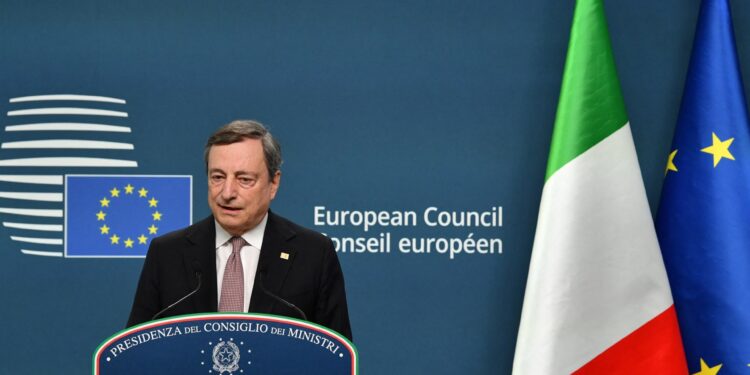Mario Draghi, the former president of the European Central Bank and former Italian prime minister, issued a stark warning about the continent’s deepening economic decline, describing the situation as a “slow-motion agony” resulting from years of economic and investment neglect.
The warning came amid concrete examples of economic deterioration on the continent, including the collapse of parts of a bridge in Dresden, Germany, which did not result in any injuries but reflects the reality facing the European economy, according to Draghi, as it indicates a failure to invest sufficiently in infrastructure and maintenance, as he pointed out in his detailed report.
Numbers point to a real crisis
Draghi explained that Europe is not facing a sudden crisis so much as it is in the midst of a “slow-burn” due to years of neglect. According to the 400-page report, Europe needs additional investments of up to 800 billion euros (about $881 billion) a year to boost its deteriorating economy.
He noted that Europe could no longer rely on factors that had helped offset slow productivity growth, such as strong global demand, cheap Russian energy, and geopolitical stability.
Draghi added that demographic challenges, such as the shrinking population in many European countries and the slow transition to the digital economy, pose major obstacles to the continent’s future. “The crisis is not a new one, but the result of long-term neglect, and if urgent action is not taken, Europe will suffer continuously,” he said.
Investments worth hundreds of billions
Draghi’s report includes very ambitious recommendations, such as issuing joint debt across Europe and creating additional investments of up to €800 billion per year to boost infrastructure and the digital economy.
But such proposals face significant political challenges, as issuing joint debt between member states is controversial.
However, Draghi stresses that these measures are necessary to avoid the “slow suffering” that threatens the entire continent.
Indicators and figures confirm the crisis
Europe has recently seen a series of events that reinforce Draghi’s warnings, according to Bloomberg. Volkswagen, for example, announced the end of a long-standing job security agreement and is currently considering closing some of its factories in Germany for the first time since its founding in 1937.
Renault also announced plans to cut jobs in France. In technology, Alpha was forced to abandon competition with tech giants like OpenAI, signaling Europe’s continued decline in the race for digital innovation.
These deteriorating conditions, according to Bloomberg, confirm the deepening economic crisis in Europe. As the burdens increase, the continent faces enormous challenges to maintain its competitiveness on the global stage. Draghi said in his report, “If Europe cannot provide prosperity, justice, freedom and peace to its citizens, it will lose its reason for existence.”
Political reactions: support and concerns
Draghi’s report did not go without reactions, as it received support from some European leaders, with Christine Lagarde (President of the European Central Bank) describing the report as a “harsh but fair diagnosis.”
“The report points to the need for urgent action to address the growing economic challenges,” Lagarde added. French Finance Minister Bruno Le Maire also expressed concern about the widening productivity gap between Europe and the United States, saying, “I share Draghi’s concern 100 percent.”
For his part, while Germany has rejected the idea of issuing joint debt, its Economy Minister Robert Habeck acknowledged that Europe needs to “change course” to achieve global competitiveness. “We have to tip the scales and pool the will and resources to make Europe globally competitive,” he said.
Possible scenarios
Without immediate action, Draghi points out, Europe risks entering a dangerous path. Possible future scenarios include national governments withdrawing from joint European initiatives and returning to a focus on local solutions, or a new crisis that forces the continent to take collective action.
But he hopes his report can provide a new impetus for collective action. “Europe’s core values are prosperity, justice, freedom and peace in a sustainable environment,” he says. “If Europe cannot deliver these values to its citizens, it will lose the very essence of its existence.”
The former ECB president concludes his report with an urgent call for joint action: “If Europe cannot take decisive action now, it will face long-term suffering.”



